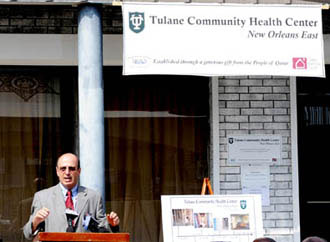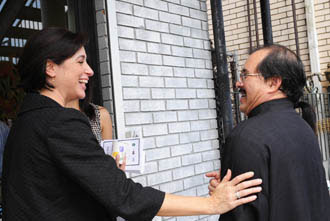Tulane Expands Community Health Care
Reaching out to provide health care in an area where it is desperately needed, Tulane University is opening a new community health center in eastern New Orleans, offering low-cost, high-quality primary care to adults 18 or older. The Tulane Community Health Center New Orleans East is a partnership between Tulane University School of Medicine and Mary Queen of Vietnam Community Development Corp.

Dr. Ben Sachs, senior vice president and dean of the Tulane University School of Medicine, announces the opening of the new primary healthcare clinic in eastern New Orleans. (Photos by Sally Asher)
The clinic, located on Alcee Fortier Boulevard, was announced at a press conference and open house on Monday (Aug. 18), attended by elected officials, members of Tulane's administration, clinic staff and community residents. It will open for patients on Monday (Aug. 25).
“This clinic is an extension of our plan to see that everyone has access to high quality, affordable primary care in New Orleans,” says Dr. Karen DeSalvo, vice dean for community affairs and health policy at Tulane University School of Medicine.
“The need is so great here,” says the clinic's physician, Dr. Chuong Nguyen. “There are not enough doctors, and the two hospitals around here are still closed. A lot of people in this area are not insured, and since this clinic is geared toward people who can't afford medical care, it's filling a great need.”
The eastern New Orleans center is the third neighborhood clinic initiative for Tulane, according to Leah Berger, director of operations for the Tulane Community Health Centers. The Tulane Community Health Center at Covenant House opened just after Hurricane Katrina, and Tulane also staffs a mobile medical unit that visits neighborhoods without sufficient health care.
DeSalvo and her team met with local community leadership, including the Mary Queen of Vietnam Community Development Corp., the New Orleans East Neighborhood Association and other neighborhood associations. The community partners wanted to have a “big footprint” community health center offering primary, eye and dental care.
“We knew that to get to that goal, we had to build a bridge,” says DeSalvo. “This clinic is that bridge, our first step toward that community health center.”

Celebrating the good news about the opening of the Tulane Community Health Center New Orleans East are Dr. Karen DeSalvo, left, vice dean for community affairs and health policy at Tulane, and the Rev. Vien The Nguyen, pastor of Mary Queen of Vietnam Church.
At the outset, the New Orleans East clinic will have six staff members. “We have one physician, Dr. Nguyen, who is from this community,” says Berger. “We have a licensed practical nurse, two medical assistants and two front desk staff.”
The clinic will focus initially on primary care for adults, eventually adding gynecology and obstetrics. As personnel and hours at the clinic increase, it could in time see 500 patients a month, says DeSalvo.
Funding for Tulane's neighborhood clinic projects comes primarily from two sources the Qatar Katrina Fund, which is devoted to helping people affected by Hurricane Katrina, and the federal government.
The federal government is committed to expanding and strengthening a network of community clinics in New Orleans, says Gen. Douglas O'Dell, coordinator of federal support for the recovery and rebuilding of the Gulf Coast region, Department of Homeland Security.
“We've provided $100 million to advance this vital mission,” O'Dell says. “This clinic is a testament to what can get done through great partnerships: the determination and resiliency of the Vietnamese American community in New Orleans East, the generosity of the people of Qatar, and the ongoing commitment of Tulane University School of Medicine to expanding primary care across New Orleans.”
Nasser Bin Hamad Al-Khalifa, chair of the Qatar Katrina Fund, adds, “The launch of the new Community Health Center at New Orleans East is a particularly happy occasion, both because it will bring quality health care directly to another Katrina-damaged neighborhood, but also because it demonstrates Tulane's careful and resourceful management of this gift to reach even beyond the ambitious goals with which we started.”
The impact of the health center on eastern New Orleans is already profound, even before the first patients come through the door on Monday.
“This center is important because a number of my people have not returned yet, especially the elderly, because of the absence of health care,” says the Rev. Vien The Nguyen, pastor of Mary Queen of Vietnam Church, and one of the clinic's strongest community advocates. “For them, it will be a place they know they can come because it is within the community. That is one major difference from pre-Katrina. Pre-Katrina, they always went somewhere else, but this clinic is theirs.
“The other thing is, this is development, not recovery, because this was not here before. To see Tulane and the Qatar Fund and others stepping in is a sign of confidence in us, in what we are doing, as well as the acknowledgement and recognition of our needs. This, and a lot more, is what this center is all about.”
